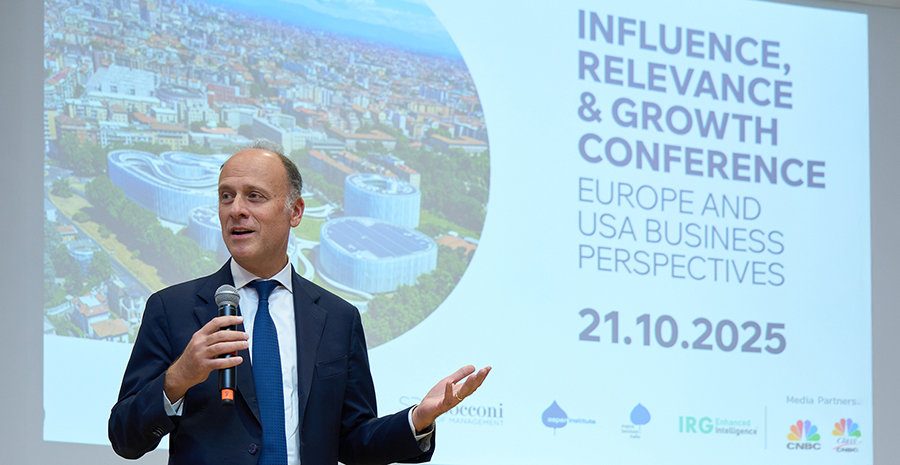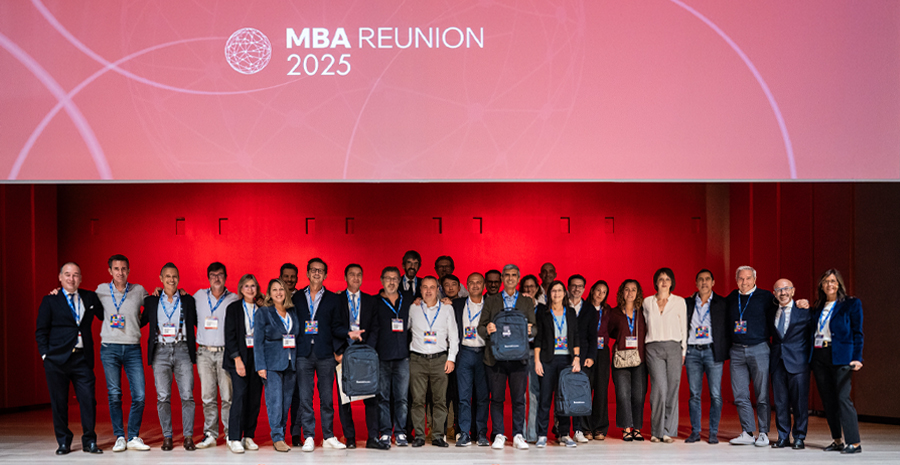
- Start date
- Duration
- Format
- Language
- 30 Oct 2025
- 4,5 days
- Class
- Italian
Some thirty participants from at least 20 countries, with an average of 25 years of professional experience and top-level positions. The profile of the eighth cohort of the DBA (Doctorate in Business Administration) immediately highlights the program’s exceptional nature.
The main goal of the participants is to acquire the skills needed to “transform from expert users into creators of knowledge,” explains the Program Director, Giada Di Stefano.
The Poster Evening held on Wednesday, May 21, was a key step in this journey. Participants presented their research questions and the projects emerging from their review of the academic literature, conducted during the first year of the program under the guidance of a faculty supervisor. The format, common in scientific conferences, was a poster session: each project was visually summarized in a poster, and the authors discussed them with SDA Bocconi faculty. The exercise pushes participants to be clear, concise, and ready to respond to any questions or objections.
Among a wide range of topics and methodologies, one trend stood out this year: a strong interest in network analysis, the study of the (especially informal) networks that connect people within an organization.
Silviu-Eugeniu Popovici drew a lot of attention by featuring in his poster a visual representation of the network of cardinals who participated in the recent conclave, created by three scholars from the NI Lab at SDA Bocconi School of Management (Beppe Soda, Alessandro Iorio, and Leonardo Rizzo). Their analysis identified Robert Francis Prevost as holding the highest status (based on the number and prestige of his relationships), spotlighting him as a serious contender for the papacy, and demonstrating to the public the power of these analytical tools. Popovici now wants to apply this kind of analysis to businesses undergoing change.
Ma Leju, on the other hand, wants to identify which qualities and network configurations make expatriates more effective. He plans to analyze the social networks of expatriates and local employees working in the same team, to determine whether different structures correlate with different performance levels, and whether tailored incentives can improve outcomes.
Antonio De Raho also believes network analysis can help companies. His particular interest lies in the role of information brokers, individuals who fill “structural holes” in a network by connecting otherwise disconnected groups, in complex organizations. His hypothesis is that these brokers become more critical as a company becomes more bureaucratic, meaning more burdened with processes that risk becoming rigid.
Naturally, other interests are also represented. At least two candidates are focusing on gender-related issues. Nicole Ann Leonardelli wants to investigate strategies and psychological mechanisms that can help women approach competitive situations with greater ease, since hesitancy in these contexts can become a barrier to professional advancement. Bethanie Castelnuovo is asking how companies can help achieve United Nations Sustainable Development Goal 5: gender equality. Her aim is to identify which gender-related reporting practices are linked to better performance on the issue and to develop a framework that encourages companies to communicate transparently.
Generational dynamics in the workplace are the focus of Dina El Koussa, who wants to study the consequences of an aging workforce, and Henri Fares, who is analyzing the values and characteristics of Generation Z to develop a framework that facilitates their integration into the workplace.
Once again this year, technology is drawing significant attention. Among others, Aiman Sadeq is analyzing the use of machine learning in finance, going back to the mid-20th century, when the core concepts were already outlined but computational power wasn’t yet sufficient to exploit them. His research will then focus on developments over the past decade, with the aim of designing new tools for financial literacy training. Tarciana Caricio Carlucci is exploring how artificial intelligence can improve innovation processes in the life sciences, while Alessandra Benedetti is evaluating what conditions are necessary to catalyze the creation of an industrial ecosystem in asset-heavy sectors.
Leadership is also examined from several angles. Youra Choi takes a particularly original approach: what factors cause leaders to make poor decisions that trigger corporate decline? And are there decision-making patterns that signal the early stages of this decline?
In family-owned businesses, leadership raises the sensitive issue of succession. Lina El Tannir is working to develop a framework that identifies the best roles for next-gen family members based on personal characteristics, business considerations, and family dynamics.
The DBA participants’ dive into research methodologies continued the following evening during the Research Evening, where two Bocconi University Management Professors, Tracy Anderson and Garrett Brady, shared their research, focusing respectively on career trajectories and leadership.


Understanding the global political landscape, and developing strategies that are adaptable to the ever-changing nature of global politics.

This course aims to focus on essential leadership skills that are deemed vital in navigating the dynamic organizational landscape.

